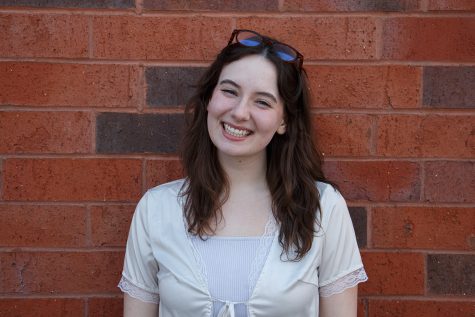Across the pond
Are dating apps really the best form of language practice? Yes, yes they are.
Photo by Grace Schutte
I felt like a small frog sitting on a lilypad of language learning. No thoughts. Head empty. Just present tense.
Note: “Across the Pond” is an on-going column in which freelance writer Grace Schutte will be writing about her study abroad experience in Valladolid, Spain.
At UW-Eau Claire, there are requirements for students studying a language — study abroad is one of them, and as a Spanish major, I am required to go abroad for a semester.
Well, gee. Twist my arm.
But, in all seriousness, immersion is the best course of action for language acquisition. For instance, I’ve been studying Spanish for eight years in a traditional classroom setting and have progressed at a snail’s pace.
I’ve struggled through all the grammar classes, done all the research projects and debated indicative tenses and subjunctive ones for hours upon hours. Every year, it was the same lessons on a loop — every year the same.
I felt like a small frog sitting on a lilypad, a lilypad of language learning, oblivious to my surroundings and the world beyond my little pond.
No thoughts. Head empty. Just present tense.
But then, I physically crossed the pond — in the literal sense — and soon found myself standing in the Valladolid train station, bone-tired and slightly delusional but somehow speaking Spanish with my host dad and a group of his friends.
The first week I felt myself improving every day. I was stressed, overwhelmed and sweating most of the time, but I was communicating. It was like a door opened inside my mind.
Concepts and vocabulary I thought I’d forgotten drifted up from the murky bottom to my wee frog brain and right out my mouth. Like I knew what I was talking about.
However, what comes up must come down, and by week two I felt as though I was stalling in my Spanish progress and somehow also declining in English. That’s the thing when it comes to languages: one can’t improve without the other atrophying — if only just a little.
It didn’t help that the only speaking practice I was getting was in school and at the dinner table with my family. On every other occasion, I was using English with both friends here and back in the States.
With all the English media I was still consuming, I sometimes forgot I was in Europe at all.
To combat this, my friends and I — along with the rest of the program — downloaded Tinder and Badoo, the two most popular dating apps in Spain, in an attempt to meet and talk with Spaniards. This strategy has proved to be one of the best opportunities to practice Spanish.
I wish I could say I was lying, but it’s true.
The main downfall to this — and there are many flaws to this plan — is that most Spaniards speak English as well and want to practice their second language, too.
For example, I went on a two-and-a-half-hour coffee date my third week here, and the guy talked about the Spanish military the whole time — all of it in English.
Being a little over a month into my stay, I can safely say physically being in a country that speaks your target language is incredibly advantageous. That being said, you still have to seek out and work for that acquisition.
Part of me hoped I would understand the preterite tense as soon as I crossed the border. That, unfortunately, isn’t how it works.
Living in a country that doesn’t speak your first language is daunting. There are good days and bad ones, moments where I befriend the waiter and others where the interaction goes so poorly that I want nothing more than to flop off my lilypad and disappear for a while.
But, with practice, patience and a positive attitude you can learn to appreciate the art of language and communication like never before.
Schutte can be reached at [email protected].

Grace Schutte is a fourth-year creative writing and Spanish student. This is her fifth semester on staff, having previously served as a staff writer, Chief Copy Editor, a freelance writer, Currents Editor, and now as the OP/ED Editor. She is currently daydreaming about living softly. She is very content.

